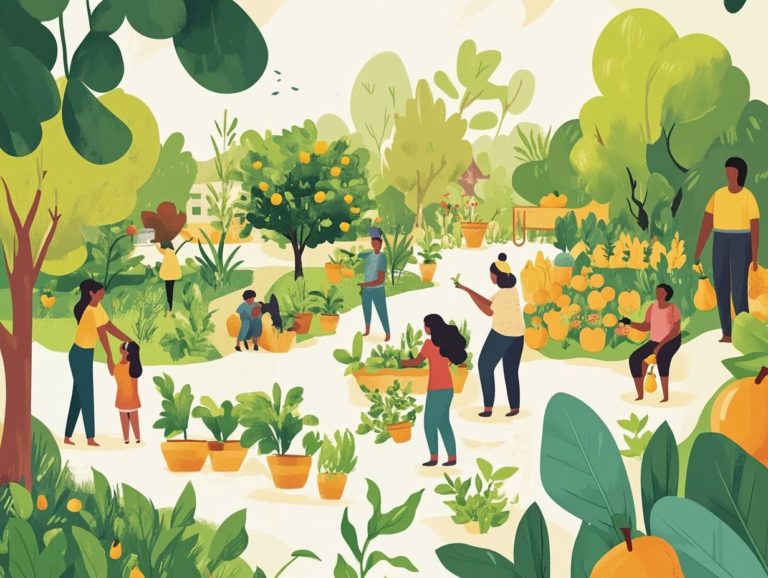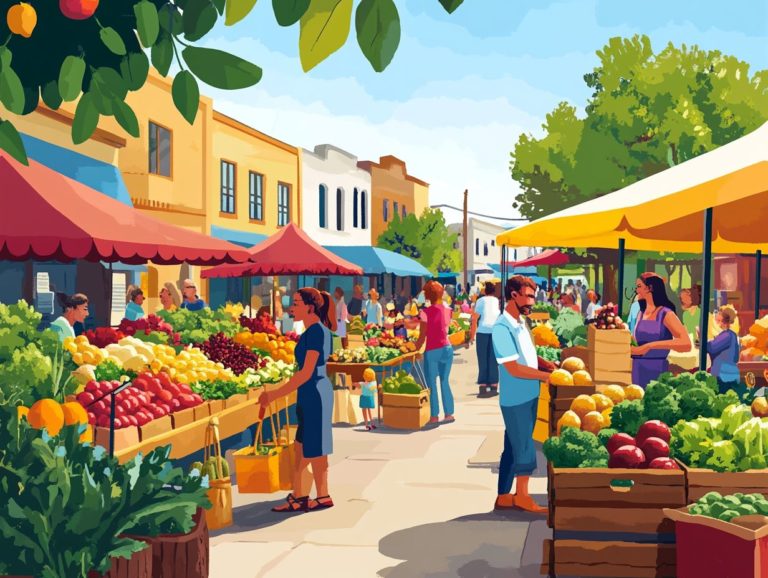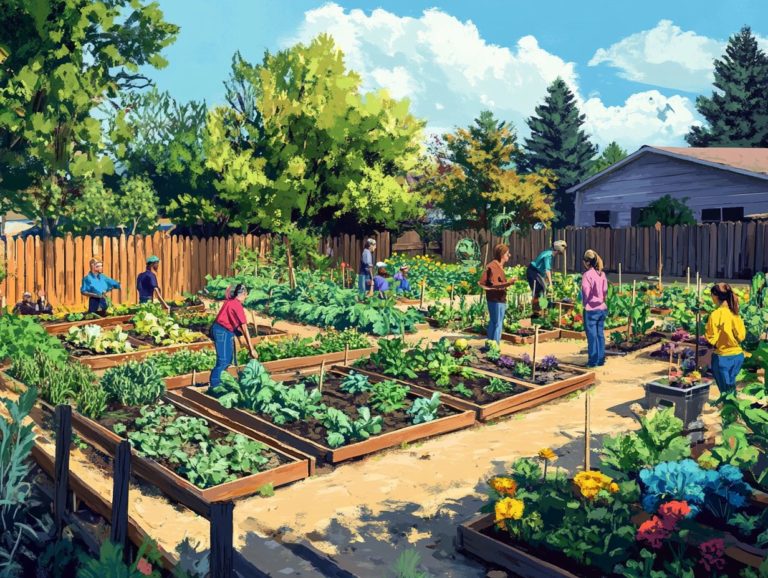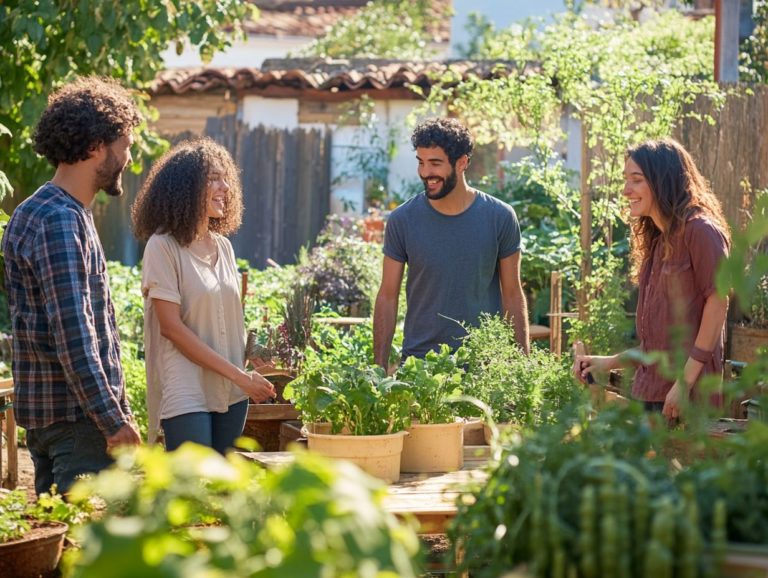62. 5 Essential Skills for Community Garden Leaders
In the vibrant realm of community gardens, leadership transcends merely having a green thumb.
As a successful community garden leader, you must cultivate a diverse array of skills to nurture both plants and people. Effective communication, organizational prowess, time management, and conflict resolution are not just optional; they are vital for fostering a thriving garden environment.
Let’s explore five essential skills for community garden leaders, highlighting their significance while offering practical strategies to enhance these competencies. Discover how strong leadership can yield flourishing gardens and create stronger communities!
Contents
- Key Takeaways:
- 1. Communication Skills
- 2. Organizational Skills
- 3. Time Management Skills
- 4. Conflict Resolution Skills
- 5. Budget Management Skills
- Why Are These Skills Important for Community Garden Leaders?
- How Can Community Garden Leaders Improve Their Communication Skills?
- What Strategies Can Community Garden Leaders Use to Stay Organized?
- How Can Time Management Help Community Garden Leaders?
- What Are Some Common Conflicts in Community Gardens and How Can They Be Resolved?
- How Can Community Garden Leaders Effectively Manage a Budget?
- What Are Some Other Important Skills for Community Garden Leaders?
- How Can Community Garden Leaders Continuously Improve and Develop These Skills?
- What Are the Benefits of Having Strong Community Garden Leaders?
- How Can Community Gardens Help to Build Stronger Communities?
- What Are Some Resources Available for Community Garden Leaders to Enhance Their Skills?
- Frequently Asked Questions
- What are the 5 essential skills for community garden leaders?
- Why is communication an essential skill for community garden leaders?
- How does organization play a role in community garden leadership and community-driven priorities?
- What kind of gardening knowledge should community garden leaders have to promote food security?
- Why is leadership important for community garden leaders in promoting community health programs?
- How does teamwork contribute to the success of a community garden and community engagement?
Key Takeaways:

- Effective communication is essential for community garden leaders to coordinate with volunteers, stakeholders, and the community.
- Organizational skills help plan and manage tasks, resources, and events efficiently, enhancing community engagement.
- Time management helps prioritize tasks and meet project deadlines.
1. Communication Skills
Effective communication skills are essential for community garden leaders. They play a crucial role in advancing public health initiatives and boosting community engagement through collaborative partnerships.
This importance is underscored within the California Healthy Cities model, which emphasizes local leadership and the value of community-driven priorities in promoting health and wellness.
By refining your communication abilities, you can effectively share educational materials, engage local partners, and inspire volunteer participation in community gardens across cities like Berkeley, Escondido, Loma Linda, and Oceanside.
Creating an atmosphere where open dialogue is encouraged leads to innovative ideas and solutions, ultimately cultivating a more vibrant and sustainable community garden and enhancing civic pride.
Effective communication also enhances the mentoring aspect of these gardens, empowering experienced members to impart invaluable skills and knowledge to younger generations. You can organize workshops that not only teach essential gardening techniques but also emphasize the significance of healthy eating habits.
Such initiatives equip individuals with crucial life skills and weave a network of intergenerational connections, thereby enhancing community capacity to support health interventions and public health initiatives.
2. Organizational Skills
Organizational skills are paramount for community garden leaders, allowing you to adeptly navigate the intricacies of managing resources and ensuring volunteers actively participate in various gardening initiatives.
These skills not only smooth out daily operations but also cultivate an environment ripe for capacity-building and strategic planning. For instance, utilizing tools like shared calendars can help you manage planting schedules and volunteer shifts, keeping everyone informed and engaged.
Implementing techniques such as goal-setting with SMART (Specific, Measurable, Achievable, Relevant, and Time-bound) objectives empowers your team to focus on tangible outcomes, boosting cooperative efforts. Regular check-ins and feedback sessions foster a sense of ownership among volunteers, encouraging sustained involvement and proactive problem-solving.
Ultimately, with a well-organized community garden, you can thrive. This leads to increased resource utilization and strengthened community ties that foster long-term sustainability practices.
3. Time Management Skills
Time management skills are truly invaluable as a community garden leader. They empower you to prioritize community-driven initiatives and create experiential learning opportunities that significantly enhance community wellness.
To make this happen, you might implement techniques such as developing detailed schedules that outline planting, maintenance, and harvesting tasks. Make sure to consider the availability of your volunteers. Establishing a rotating schedule for garden maintenance can help distribute the workload evenly, ensuring that no single individual feels overwhelmed.
By setting aside specific times for educational workshops, you can foster community engagement and bolster social capital. Successful community gardens often leverage communication tools like calendars or apps to keep everyone informed and aligned with project timelines. This reinforces their collective commitment to nurturing both plants and community relationships.
4. Conflict Resolution Skills
Conflict resolution skills are vital for you as a community garden leader. They enable you to navigate the challenges of sharing a garden and tackle health disparities that may emerge within diverse groups, enhancing overall community health programs.
When people from various backgrounds converge to share a common space, differing opinions about resource allocation, garden layouts, or planting schedules can spark friction. In these moments, effective communication and active listening which means truly paying attention to what others say are your best allies.
By cultivating an environment where everyone feels heard and valued, you can address tensions before they escalate into bigger issues. Establishing clear agreements and holding regular meetings sets a precedent for collaboration and understanding.
When conflicts are thoughtfully resolved, it enhances your gardening experience and fosters civic pride. This strengthens the sense of community and interconnectedness among all members through shared cultural traditions.
5. Budget Management Skills
Budget management skills are essential as a community garden leader. They facilitate effective resource allocation and compliance with food and nutrition policies, supporting community improvements and championing sustainability practices.
Discovering diverse funding sources like grants, donations, and sponsorships can supercharge your garden s financial health. Keeping a close eye on your expenses enables you to track spending and pinpoint areas where you can either save or make wise investments.
Establishing clear financial goals will steer your planning process, balancing both immediate needs and long-term ambitions. To maintain financial sustainability, foster relationships with local businesses for support and organize community fundraising events that actively engage participants.
Implementing educational workshops will elevate awareness about the benefits of gardening. This fosters greater community involvement and ultimately enhances your financial stability.
Why Are These Skills Important for Community Garden Leaders?
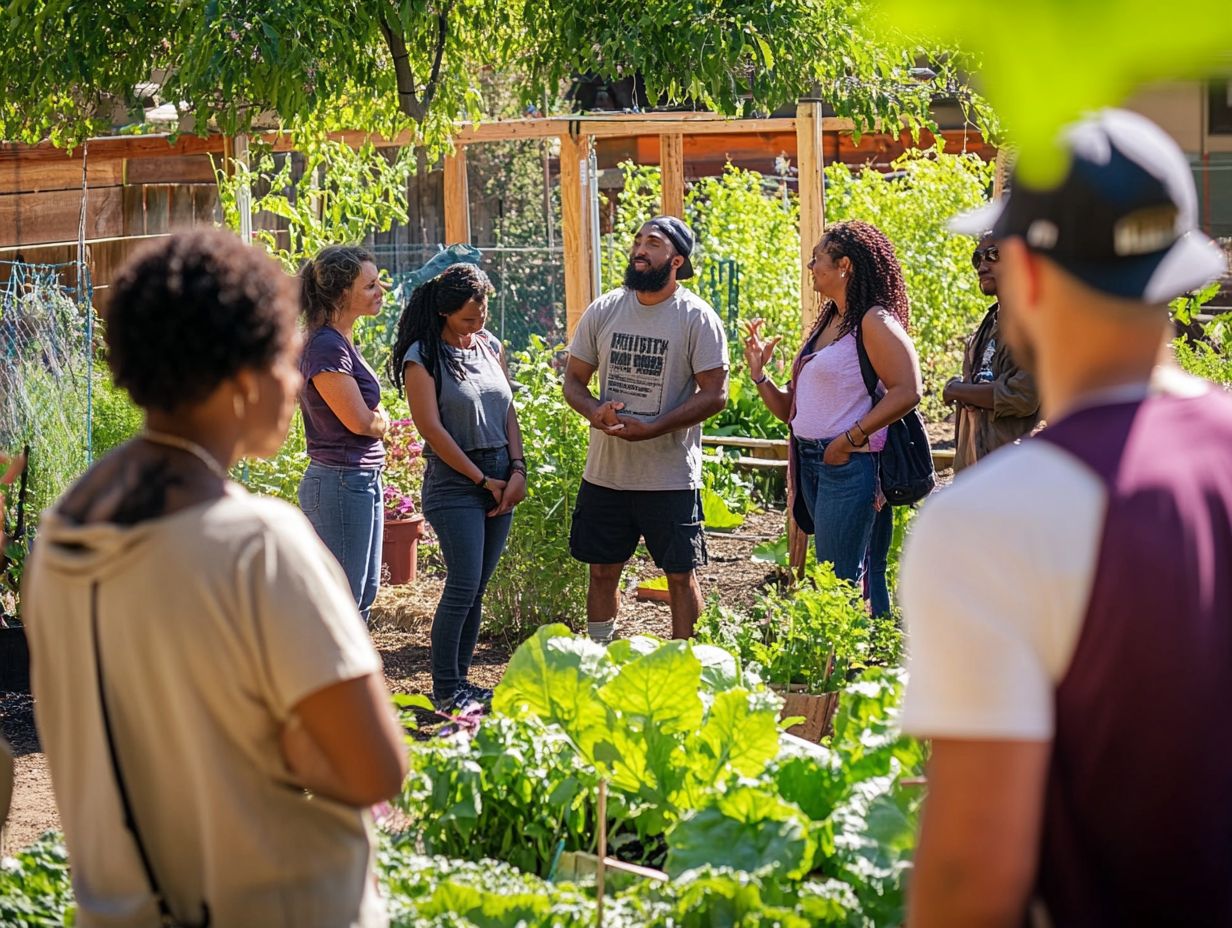
The skills of communication, organization, time management, conflict resolution, and budget management are essential as a community garden leader. They directly influence the success of health interventions and community improvements in diverse urban environments while addressing environmental determinants of health.
These abilities empower you to engage effectively with various stakeholders, forging meaningful partnerships that strengthen community ties. When you wield strong communication skills, you ensure that every voice is heard, fostering an inclusive atmosphere where diverse perspectives can flourish.
Your organizational skills help streamline activities and allocate resources efficiently, maximizing your impact on public health. Time management and conflict resolution skills enable you to navigate challenges with poise, ensuring projects stay on course and relationships remain robust.
Effective budget management sustains not only the garden but also enhances food security. It provides your community with fresh produce while cultivating a vital sense of social capital for collective well-being and promoting health promotion.
Master these skills to unlock the full potential of your community garden!
How Can Community Garden Leaders Improve Their Communication Skills?
Community garden leaders can enhance their communication skills by utilizing educational materials and seeking technical assistance from local partners. This approach creates a more inclusive gardening environment.
Consider using workshops to hone communication techniques. Implement structured feedback systems that invite input from all participants. For example, a vibrant community garden in Portland hosts monthly meetings where members share their experiences and suggestions, ensuring every voice is heard.
By refining public speaking abilities through community classes, leaders can effectively express their vision. When leaders communicate with clarity and openness, they strengthen bonds among gardeners and attract new participants. Successful initiatives in various neighborhood gardens illustrate this impact.
What Strategies Can Community Garden Leaders Use to Stay Organized?
Community garden leaders can use several strategies to stay organized. These include good planning, leveraging local resources, and enhancing volunteer participation.
By adopting digital calendars, you can coordinate planting schedules and community events effectively. Project management software tools that help you keep track of tasks simplifies your responsibilities, allowing your team to assign tasks easily and track progress.
Regular meetings, whether in person or virtual, spark lively discussions among volunteers. They provide a platform to celebrate successes and address challenges together. Many thriving community gardens implement frameworks like the ‘Garden Leadership Model’, which emphasizes collaboration and clear role assignments, creating a vibrant space for both plants and community interactions.
How Can Time Management Help Community Garden Leaders?
Time management can be a game changer for community garden leaders. It enables you to prioritize community-driven initiatives and craft experiential learning opportunities that promote sustainability practices.
By using a structured approach to organizing your tasks, you can ensure project deadlines are met while engaging community members meaningfully. This strategy fosters enriched participation and makes volunteers feel valued.
Effective scheduling helps your garden activities run smoothly. Ensure that crops are planted and harvested at optimal times. Set realistic goals and timelines by breaking larger projects into smaller, manageable tasks. This cultivates a greater sense of accomplishment and keeps volunteers motivated throughout the gardening season.
What Are Some Common Conflicts in Community Gardens and How Can They Be Resolved?
Common conflicts in community gardens often arise from issues surrounding community ownership and differing visions for local governance. However, these challenges can be tackled through collaborative dialogue and fostering a sense of civic pride.
Disagreements typically stem from varying opinions on garden maintenance, the distribution of produce, and the types of plants that should flourish. To address these concerns, hold regular community meetings. This approach allows participants to voice their perspectives and negotiate solutions in an open, welcoming environment.
Establishing clear participation guidelines sets expectations and protects the interests of everyone involved. Mediation can also help by introducing a neutral party to facilitate discussions and resolve disputes. Let s keep our community garden a fun and thriving space for everyone!
How Can Community Garden Leaders Effectively Manage a Budget?
Effective budget management is essential for you as a community garden leader, ensuring that your projects remain financially sustainable while addressing economic factors and enhancing food security.
By meticulously planning your budgets, you can allocate resources efficiently and track expenses with precision. This approach enables you to uncover potential funding opportunities that resonate with your community’s needs.
Embracing a transparent financial approach cultivates trust among community members, encouraging them to actively participate in the financial decision-making process. Sharing budget outcomes and insights enhances transparency and fosters accountability.
This collaborative engagement not only fortifies the garden initiative but also ensures that your financial strategies reflect the diverse priorities of the community, simplifying the path to building long-term support for your essential projects.
What Are Some Other Important Skills for Community Garden Leaders?

Along with honing your communication and organizational skills, as a community garden leader, you should also cultivate vital competencies like building community capacity, promoting volunteer participation, and implementing health promotion strategies.
These skills can significantly enhance the overall effectiveness of the garden and amplify its impact on the community. For example, strong leadership gives you the power to inspire and motivate volunteers, fostering a sense of ownership and commitment among participants.
Empathy allows you to appreciate the diverse backgrounds and needs of community members, ensuring everyone feels included and valued. Adaptability is equally crucial; it enables you to respond to changing conditions, such as unpredictable weather or shifts in community interest.
By effectively harnessing these skills, you can create a vibrant, supportive environment that not only grows food but also nurtures strong community bonds.
How Can Community Garden Leaders Continuously Improve and Develop These Skills?
As a community garden leader, you have the opportunity to continuously refine and expand your skills through ongoing training, utilizing educational resources, and engaging in intergenerational mentoring with local partners.
By exploring diverse avenues for skill development like attending hands-on workshops and enrolling in online courses you can enhance your expertise and adapt to evolving gardening practices. These experiences not only expand your gardening knowledge but also give you the power to cultivate a more vibrant and inclusive community space.
The importance of lifelong learning in community gardening is immeasurable; it nurtures a culture of innovation and sustainability. This culture allows you to share insights and experiences that ultimately benefit everyone involved in the gardening journey.
What Are the Benefits of Having Strong Community Garden Leaders?
Having strong community garden leaders offers you a wealth of benefits, from enhancing community wellness to implementing effective health interventions and boosting social capital within your neighborhood.
These leaders do more than just cultivate plants; they nurture relationships among community members, fostering a profound sense of belonging and mutual support.
As you and your neighbors come together to tend to the garden, you ll likely notice an uptick in volunteer participation, welcoming individuals of all ages and backgrounds into the fold. This collaboration not only yields delicious produce and encourages sustainable practices but also creates a vibrant atmosphere where shared goals thrive.
Under the guidance of dedicated leaders, your community will become more resilient, suitably equipped to tackle various challenges while promoting environmental awareness and food security, ultimately benefiting generations to come.
How Can Community Gardens Help to Build Stronger Communities?
Community gardens significantly enhance the fabric of your neighborhood by fostering engagement, promoting growing food in cities, and improving public health outcomes.
These vibrant green spaces do much more than provide fresh produce; they serve as essential platforms for food security. They enable you to access healthy options while reducing dependence on commercial food systems. By uniting individuals from diverse backgrounds, community gardens encourage you and your neighbors to volunteer. This allows everyone to contribute their time and skills to cultivate the land. This collaborative effort not only helps nurture the plants but also strengthens the relationships among community members.
These gardens also create opportunities for meaningful intergenerational connections, where seasoned gardeners can share their wisdom with younger participants. This exchange fosters a sense of belonging that transcends age barriers, enriching the community as a whole.
What Are Some Resources Available for Community Garden Leaders to Enhance Their Skills?
Exciting resources are available for community garden leaders ready to boost their skills! You can access helping programs, seek guidance from the California Department of Health Services, and draw support from the American Community Gardening Association.
Beyond these invaluable resources, you ll find specialized training workshops offered by local agricultural extensions and universities. These sessions cover a range of topics, from sustainable gardening practices to effective community outreach strategies. They equip you with the tools you need to succeed.
Online courses are also readily available, providing you with flexible learning opportunities on everything from organic farming techniques to grant writing essentials. Don t miss the chance to explore funding opportunities, such as grants from the USDA or local non-profits, which can substantially elevate your initiatives.
With this support, you can procure materials, hire experts, or implement innovative projects that engage your community and promote environmental stewardship.
Frequently Asked Questions
What are the 5 essential skills for community garden leaders?
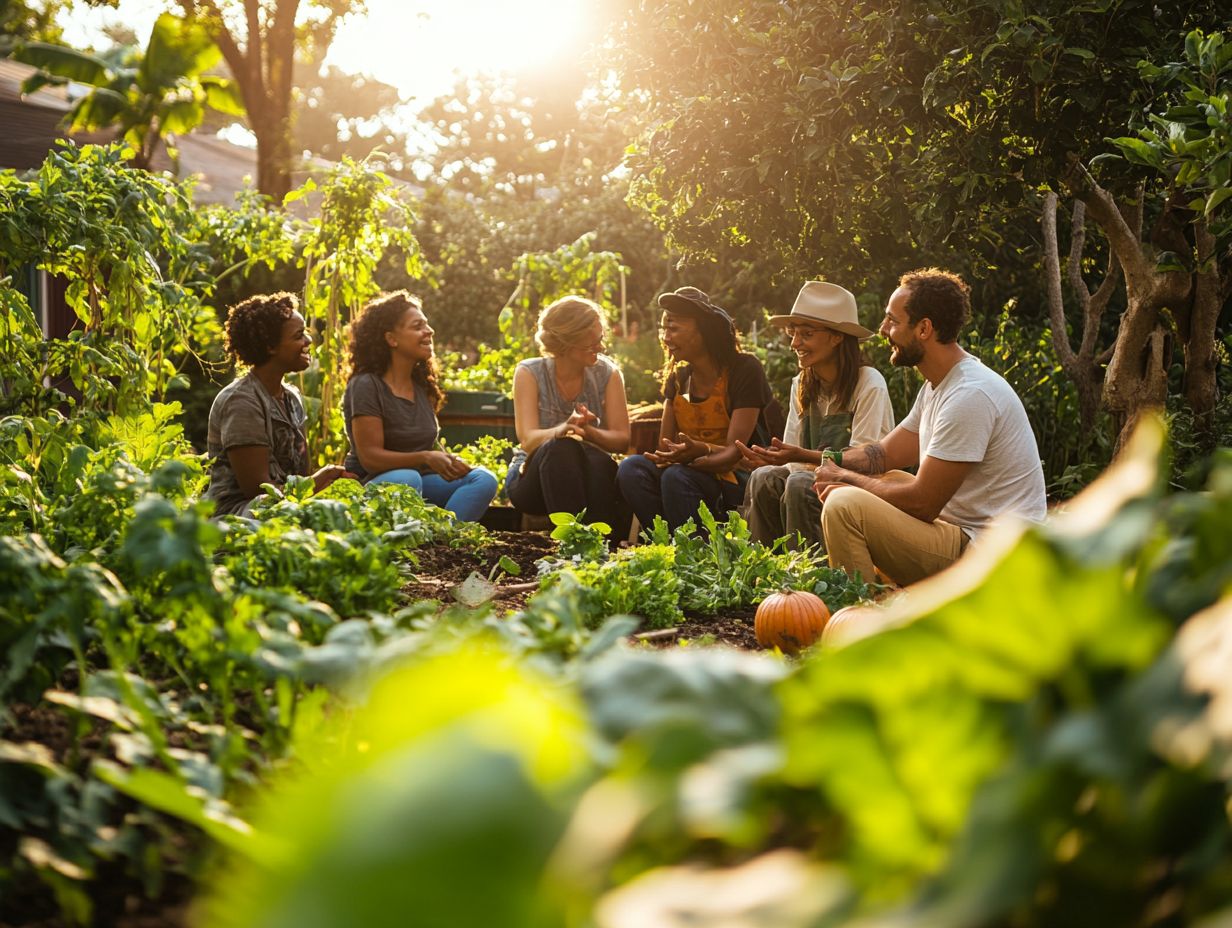
The 5 essential skills for community garden leaders are communication, organization, knowledge of gardening, leadership, and teamwork. For more insights, check out the best practices for community gardening.
Why is communication an essential skill for community garden leaders?
Communication is crucial for community garden leaders because it allows them to effectively relay information, coordinate tasks, and build relationships with volunteers and stakeholders.
How does organization play a role in community garden leadership and community-driven priorities?
Organization helps community garden leaders keep track of tasks, schedules, and resources, ensuring that the garden runs smoothly and efficiently.
What kind of gardening knowledge should community garden leaders have to promote food security?
Community garden leaders should have a basic understanding of gardening techniques, plant care, and garden planning to effectively lead and support volunteers.
Why is leadership important for community garden leaders in promoting community health programs?
Leadership skills are essential for community garden leaders as they guide and motivate volunteers, make decisions, and represent the garden to the community.
How does teamwork contribute to the success of a community garden and community engagement?
Teamwork is crucial for community garden leaders as it allows them to delegate tasks, collaborate with volunteers, and create a sense of community within the garden.

